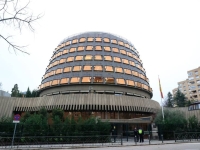Politics
Unprecedented institutional crisis in Spain
Open confrontation
USPA NEWS -
Spain is experiencing an unprecedented institutional crisis. The lack of agreement to renew the highest instances of the judiciary - the Constitutional Court, the Supreme Court and the General Council of the Judiciary -, together with the Government's decision, later ratified by Parliament, to repeal the crime of sedition and reduce the penalties for the crimes of embezzlement of public money, has caused an unprecedented confrontation between the right and the left in Parliament, between the right and the Government of the socialist Pedro Sánchez, and between the judges and the Government.
The latest decision of the Constitutional Court, adopted on Monday night, provisionally paralyzing the reform of the Penal Code that repeals the crime of sedition and reduces the penalties for embezzlement, provoked an avalanche of criticism on Tuesday that is already spreading to Spanish society itself. The Government of Prime Minister Pedro Sánchez and Parliament expressed their disagreement with the decision of the Constitutional Court, but affirmed that they respect the ruling and will obey its provisions. The Constitutional ruling is the result of an appeal filed by the conservative Popular Party, which opposes the reform of the Penal Code and considers illegal the changes approved by the Government.
The promoters of the resource - the conservative Popular Party - denounce that, with the changes approved by the socialist Government, it is intended to benefit the Catalan separatists condemned for the secession attempt on October 27, 2017. That day, the regional Parliament of Catalonia approved a unilateral declaration of independence, when Spain was governed by the Popular Party. The Government headed by Mariano Rajoy at the time applied article 155 of the Spanish Constitution, which allows suspending the functions of a region that fails to comply with the obligations imposed by the Constitution or that seriously threatens the general interest of Spain. The pro-independence leaders were arrested or fled to other countries. This is the case of the then Catalan president, Carles Puigdemont, who took refuge in Belgium.
This Monday, Prime Minister Pedro Sánchez appeared before the media to hold the Popular Party responsible for the institutional crisis, and announced that his Government will take "the necessary measures" to defend the approved changes to the Penal Code. The national Parliament also announced that it will present allegations before the Constitutional Court and will appear as a party in the case. The nationalist partners of the Spanish Government called for calm, while the right wing of Parliament, led by the conservative Popular Party, asked the Government to withdraw its penal reform and classify the calling of an illegal referendum to renegotiate the renewal of the maximum organs of the judiciary.
For its part, the European Commission affirmed on Monday that it supports the Spanish Constitutional Court and reminded the Government of Prime Minister Pedro Sánchez that "far-reaching reforms require prior consultations." Precisely what the right wing of Parliament defends, since the approval of the reforms of the Criminal Code was done without the mandatory prior reports from the Council of State and the legal services of the Government and Parliament.
Liability for this article lies with the author, who also holds the copyright. Editorial content from USPA may be quoted on other websites as long as the quote comprises no more than 5% of the entire text, is marked as such and the source is named (via hyperlink).






